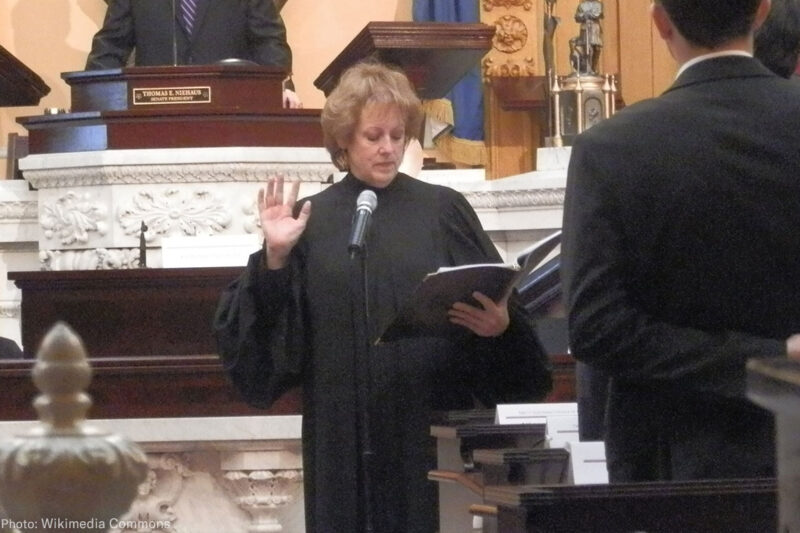Ohio’s Chief Justice Stands Up to Jeff Sessions in Support of Low-Income People


In late December, Attorney General Jeff Sessions rescinded crucial guidance that advised courts not to unfairly punish people simply for being poor. While Sessions furthers the criminalization of poverty, Ohio’s chief justice is reminding her judges that the people who pass through their courtrooms are not ATMs.
On January 29, Maureen O’Connor sent a letter to all Ohio trial judges to ensure they were aware that the law has not changed and “court cases are not business transactions.” Her thoughtful letter is a stark contrast to Jeff Sessions’ abrupt decision to rescind a guidance that had helped judges and court administrators around the country reform court practices to guard against abuses like debtors’ prisons — the jailing of poor people who cannot afford to pay court fines and fees.
O’Connor made clear that despite the department’s decision, the Constitution remains the supreme law of the land and that the rights enshrined in that document are unchanged. She also reminded judges of their obligation to serve the public and promote fairness and equal treatment of rich and poor:
“We have a special responsibility to act in a manner that bolsters public trust and confidence in the fair administration of justice for everyone. Practices that penalize the poor simply because of their economic state; that impose unreasonable fines, fees, or bail … upon on our citizens to raise money or cave to local funding pressure; or that create barriers to access to justice are simply wrong. No rescission of guidance by the [DOJ] changes that.”
As co-chair of the National Task Force on Fines, Fees, and Bail Practices, O’Connor has long been a leader in Ohio and the nation on reforming practices that criminalize poverty. With the stroke of a pen, O’Connor showed leadership at a time when the country needs it. Her letter brings attention to the devastating impact of excessive court fines and fees and bail practices on the lives of low-income people and the justice system’s obligation to protect people’s rights, even when they are poor.
In Ohio, particularly, O’Connor’s letter is crucial.
During the ACLU of Ohio’s 2013 investigation into debtors’ prison practices across the state, we met countless people who were tethered to the criminal justice system simply because they were too poor to pay off court fines and fees. We issued a report that told the story of countless more people who were given unjustly high court fines and fees that they could not afford to pay and rigid payment plans that kept them trapped in the grips of poverty.
One young couple owed thousands of dollars in fines and fees from low-level convictions, such as disorderly conduct and drinking underage. Each month, the couple was forced to make the impossible choice of whose fines they would continue to pay so one of them could stay at home with their infant while the other would spend another 10 days in jail for fines that they simply could not afford to pay. Our report also told the story of a man who could not afford to pay fines because he was recently laid off. With no health insurance and mounting medical debt, he simply could not pay his court fines.
After hearing these stories, many Ohio judges admitted that they were unaware that existing laws, including Ohio statutes and the U.S. Constitution, limit the ways in which court fines and fees can be imposed and collected. Chief Justice O’Connor took action to make sure that state judges would no longer be confused. She issued a detailed bench card outlining the rules for collecting fines and fees, ensured that judges throughout Ohio were trained on those rules, and held accountable judges who continued to violate the law by jailing people for nonpayment without giving them a hearing on their ability to pay.
The stark reality is that in many courts across the country, the size of your bank account determines the type of justice you receive. But Chief Justice O’Connor’s actions show that judges can chart a path toward fairness and restore trust in the justice system. ACLU affiliates in Mississippi, Washington, New Hampshire, and Michigan, are continuing this work – implementing reforms, leading community conversations, and making progress.
The abdication of leadership by the Department of Justice in the fight against debtors’ prisons and other injustices stemming from abusive court fines and fees has opened a path to leadership for others. Chief Justice O’Connor took the first step forward. Other state chief justices should follow suit and remind judges in their states that the U.S. Constitution remains the law of the land, regardless of what Jeff Sessions may think or do.

